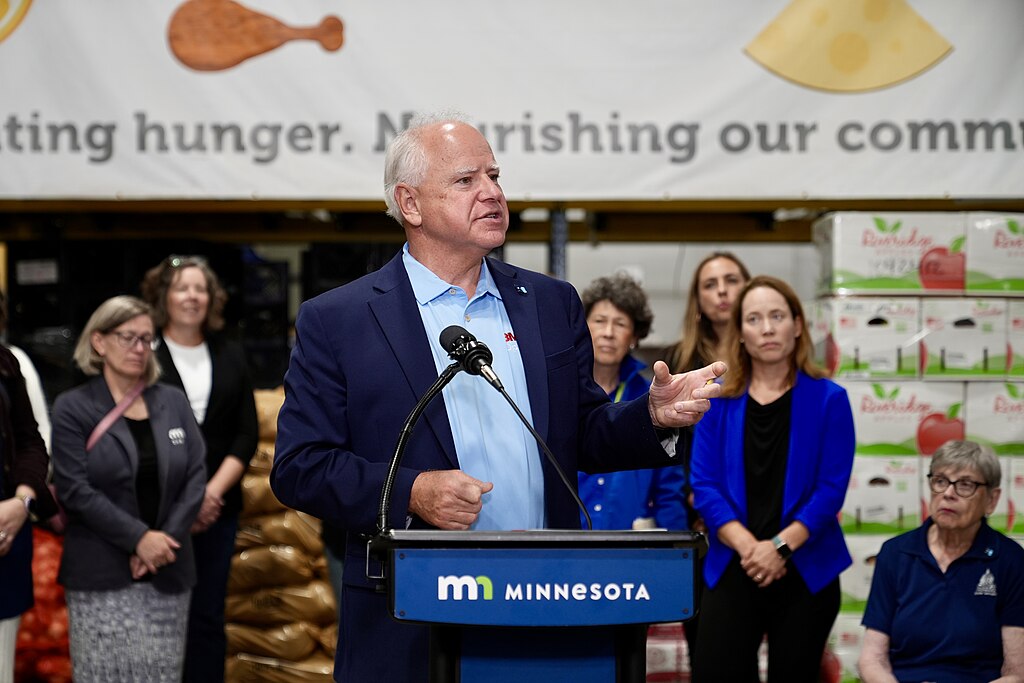Minnesota Governor Tim Walz has sparked a political firestorm with his recent comments accusing former President Donald Trump and Ohio Senator J.D. Vance of waging a "war on workers." Walz’s remarks, delivered with a sharp tone, are part of a broader narrative that seeks to paint Trump and Vance as out of touch with the needs of everyday Americans, particularly those in the working class.
As the 2024 presidential election draws closer, Walz’s accusations add fuel to an already heated debate over labor rights and the economic policies that will shape the future of the country. The governor's criticism focuses on what he describes as the harmful effects of Trump and Vance's economic strategies, which he claims have consistently prioritized the interests of the wealthy and powerful at the expense of working people.
According to Walz, Trump and Vance have shown little regard for the struggles of American workers, choosing instead to exploit their vulnerabilities for political and financial gain. He argues that their policies have led to stagnant wages, weakened labor protections, and an overall decline in the quality of life for millions of workers across the country. This, Walz suggests, is evidence of a deliberate strategy to undermine the labor force in favor of corporate interests.
The governor’s comments are particularly pointed given the current political climate, where issues like income inequality, workers' rights, and economic justice are at the forefront of the national conversation. By framing Trump and Vance as adversaries of the working class, Walz is tapping into a growing sense of frustration among voters who feel that the economic system is rigged against them.
Walz’s criticism also comes at a time when both Trump and Vance are positioning themselves as champions of the American worker, each claiming to have the solutions to the economic challenges facing the country. Trump, who has consistently portrayed himself as a defender of blue-collar workers, touts his record on job creation and economic growth during his presidency. Vance, a rising star in the Republican Party, has also sought to align himself with working-class voters, particularly in his home state of Ohio.
However, Walz’s remarks challenge these narratives, suggesting that the true impact of Trump and Vance's policies has been to weaken, rather than strengthen, the position of American workers. He points to their opposition to labor unions, support for corporate tax cuts, and efforts to roll back regulations as evidence of a broader agenda that favors the wealthy over the working class.
As the 2024 election approaches, the battle over who truly represents the interests of American workers is likely to intensify. Walz’s sharp critique of Trump and Vance is a clear indication that Democrats plan to make labor rights and economic fairness central themes in their campaign strategy.
For now, the war of words between Walz and his Republican counterparts is just the beginning of what promises to be a contentious and deeply consequential debate over the future of the American economy and the role of government in protecting the rights of workers.



 Marco Rubio to Brief Congress After U.S.-Israeli Strikes on Iran
Marco Rubio to Brief Congress After U.S.-Israeli Strikes on Iran  AI is already creeping into election campaigns. NZ’s rules aren’t ready
AI is already creeping into election campaigns. NZ’s rules aren’t ready  EU Urges Maximum Restraint in Iran Conflict Amid Fears of Regional Escalation and Oil Supply Disruption
EU Urges Maximum Restraint in Iran Conflict Amid Fears of Regional Escalation and Oil Supply Disruption  Russia Signals Openness to U.S. Security Guarantees for Ukraine at Geneva Peace Talks
Russia Signals Openness to U.S. Security Guarantees for Ukraine at Geneva Peace Talks  Australia Rules Out Military Involvement in Iran Conflict as Middle East Tensions Escalate
Australia Rules Out Military Involvement in Iran Conflict as Middle East Tensions Escalate  UK Accepts U.S. Request to Use British Bases for Defensive Strikes on Iranian Missiles
UK Accepts U.S. Request to Use British Bases for Defensive Strikes on Iranian Missiles  Middle East Conflict Escalates After Khamenei’s Death as U.S., Israel and Iran Exchange Strikes
Middle East Conflict Escalates After Khamenei’s Death as U.S., Israel and Iran Exchange Strikes  Zelenskiy Urges Change in Iran After U.S. and Israeli Strikes, Cites Drone Support for Russia
Zelenskiy Urges Change in Iran After U.S. and Israeli Strikes, Cites Drone Support for Russia  Trump Warns Iran as Gulf Conflict Disrupts Oil Markets and Global Trade
Trump Warns Iran as Gulf Conflict Disrupts Oil Markets and Global Trade  U.S.-Israel Strike on Iran Escalates Middle East Conflict, Trump Claims Khamenei Killed
U.S.-Israel Strike on Iran Escalates Middle East Conflict, Trump Claims Khamenei Killed  Netanyahu Suggests Iran’s Supreme Leader Khamenei May Have Been Killed in Israeli-U.S. Strikes
Netanyahu Suggests Iran’s Supreme Leader Khamenei May Have Been Killed in Israeli-U.S. Strikes  Failure of US-Iran talks was all-too predictable – but Trump could still have stuck with diplomacy over strikes
Failure of US-Iran talks was all-too predictable – but Trump could still have stuck with diplomacy over strikes  Trump Launches Operation Epic Fury: U.S. Strikes on Iran Mark High-Risk Shift in Middle East
Trump Launches Operation Epic Fury: U.S. Strikes on Iran Mark High-Risk Shift in Middle East  HHS Adds New Members to Vaccine Advisory Panel Amid Legal and Market Uncertainty
HHS Adds New Members to Vaccine Advisory Panel Amid Legal and Market Uncertainty  Why did Iran bomb Dubai? A Middle East expert explains the regional alliances at play
Why did Iran bomb Dubai? A Middle East expert explains the regional alliances at play  Suspected Drone Strike Hits RAF Akrotiri Base in Cyprus, Causing Limited Damage
Suspected Drone Strike Hits RAF Akrotiri Base in Cyprus, Causing Limited Damage 































